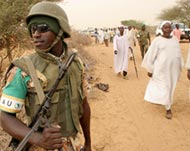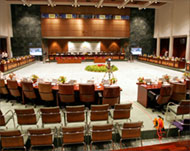African leaders unite on UN seats bid
All 53 governments that make up the African Union have unanimously agreed to demand the organisation’s representation on the UN Security Council.

Demanding two permanent seats with veto rights, African Union (AU) heads of state and officials in Libya on Tuesday said the organisation had already presented its demand to the UN.
The text of the declaration made public on Tuesday confirmed that it was seeking five non-permanent rotating seats on the Security Council as well.
“We reaffirm our commitment to ensure the success, in unity and solidarity, of our common position with a view to enabling Africa to choose its representatives in the Security Council to act in its name and on its behalf”, the leaders said in the declaration on UN reform.
Technical difficulties
But so far the Sirte summit in Libya has not touched on the issue of who would sit in the two potential seats.
South Africa-based analyst Dr Anne Hammerstad told Aljazeera.net on Tuesday that the summit had agreed on the easy things but had yet to tackle issues that would most likely generate heated debate.
 |
|
An African Union peace-keeper |
“The whole thing might unravel when it comes to which African countries will represent the AU -there are at least eight countries that have declared themselves candidates.
“Countries such as Nigeria, South Africa, Libya, Egypt, Algeria and Kenya are going to fight hard. And if the AU only gets one seat, the problem is going to be all the more difficult,” she said.
Implications
Recognising that the AU has enabled African nations to create a genuine solidarity on major issues, Hammerstad added few at the UN would advocate giving the organisation veto powers.
“Obviously, the AU has done some great work – such as the peace-keeping operations in Burundi – but I don’t think either the US or China would allow it to have veto powers for two reasons.
“Firstly, it is argued that if the Security Council is expanded and all members have a veto, it is going to be in permanent grid-lock.
“Additionally, however, I expect some nations would not welcome an AU veto on issues such as Darfur or the extradition of member-state suspects to the ICC,” Hammerstad said.
“Nevertheless, I think it would be a very positive development if countries such as Nigeria or South Africa did make it on to the council and give the continent representation.”
More AU unanimity
Meanwhile, the AU has also unanimously adopted a declaration ahead of Wednesday’s G8 summit, calling for the debt of all African countries to be forgiven and for all agricultural subsidies to be abolished.
|
“Obviously, the AU has done some great work – such as the peace-keeping operations in Burundi – but I don’t think either the US or China would allow it to have veto powers” Dr Anne Hammerstad, |
AU spokesman Adam Thiam confirmed that the contents of the “common position” statement had all been adopted by the heads of state.
The declaration welcomed June’s debt relief package extended by G8 countries to 18 poor countries, 14 of them in Africa, but said debt forgiveness “must be applied by all creditors [multinational, bilateral and commercial], including the African Development Bank”.
The statement also called for “the abolition of subsidies that stand as an obstacle to trade” and for the adoption of a calendar for the abolition of these subsidies.
AU history
Officially launched in Durban in 2002, some 53 nations make up the African Union – though two-thirds of its funding comes from just five members (Libya, Nigeria, Egypt, Algeria and South Africa).
It replaced the older Organisation of African Unity (OAU) that had been condemned internationally as an ineffective talking shop for “dictators”.
 |
|
Libya has been a prime mover in |
According to the AU charter, its main objective is to “rid the continent of the remaining vestiges of colonisation and apartheid, to promote unity and solidarity among African states and to safeguard the sovereignty and territorial integrity of member states”.
But AU critics question whether its “peer review” scheme, by which member states ensure each other’s government adhere to democratic principles, is a genuine instrument of reform – particularly as the review is a voluntary scheme.
AU teeth
Nevertheless, the AU is currently in the process of setting up a human rights court, a central bank and a monetary fund, and, by 2023, an African Economic Community with a single currency.
To this end, the body regards conflict resolution as a top priority and has opened a Peace and Security Council in May 2004 that has a mandate to intervene in conflicts.
The AU can also authorise troop deployments in circumstances which include genocide and crimes against humanity, and it can mandate peacekeeping missions.
The council plans to have a stand-by rapid-reaction force in place by 2010.